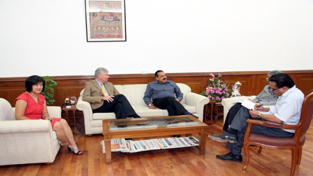
Excelsior Correspondent
NEW DELHI, June 25: A Canadian delegation, led by its High Commissioner, Stewart Beck today called on Dr. Jitendra Singh, Union Minister of State (MoS) in Prime Minister’s Office (PMO), Personnel, Public Grievances and Pensions, Science & Technology (Independent Charge), Earth Sciences (Independent Charge), Atomic Energy and Space at his office and offered to take forward Canadian collaboration in “Ganga Action Plan” (GAP) undertaken in a big-way by the Narendra Modi Government.
Dr. Jitendra Singh appreciated the gesture of the Canadian delegation and said, the “Ganga Action Plan” is not a mere river project for us but also a matter of faith for millions of Indians and therefore, it will be a valuable addition to the joint collaboration between India and Canada in the area of “water for health”. This is bound to further promote India-Canada partnership at different levels, he observed.
A joint Science and Technology Committee meeting of the two countries,according to Dr Jitendra Singh, will be held in the first half of next year and it would aim at announcing new programmes and initiating new awards for the already existing programmes.
Referring to a wide scope of collaboration between the two countries, Dr. Jitendra Singh mentioned the action plan envisaging collaboration in the areas of Bio-technology, Health, Environment, Energy, Food Security, Nano-Technology Science, Communication and Industrial R&D. He also said, there will be an attempt to expedite the ongoing projects between the two countries on ‘PET-MRI Automatic Tumour Detection and Recognition’ thus adding another dimension to non- invasive detection of tumour using PET and MRI images.
Dr. Jitendra Singh said, two joint international patent applications by India and Canada have been filed under a project at ICGEB, Delhi to develop new potential anti-malarial drugs.
Dwelling upon future vistas, Dr. Jitendra Singh said, the India-Canada Science and Technology relationship has the potential for future growth. The need to connect the best academic and R&D institutions from both countries will be important for facilitating new knowledge creation through joint research and exchange of personnel, he added.

